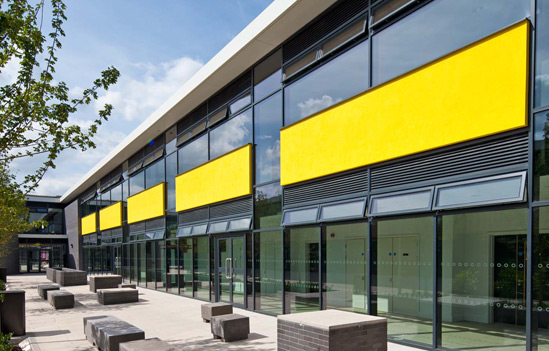The award winning new Bideford College sustainability project used 100% re-cycled aluminium billet in the production of aluminium Sapa 55 and 75 casement windows. Hazlemere Commercial designed, manufactured and installed all the aluminium curtain walling, aluminium windows and commercial entrance doors for main contractors Morgan Sindall in conjunction with the architects and Sapa Building Systems.
The new college includes a 70m aluminium sloping curtain wall double glazed roof light. All the curtain walling, windows and doors were fabricated by Hazlemere Commercial in their High Wycombe factory located on Cressex Business Park, before being installed by their own expert installers, on time and on budget.
The construction of a new purpose built college was undertaken as part of the Governments “Building Schools for the Future” programme, with the emphasis on using sustainable environmentally friendly, energy saving products, such as the double glazed aluminium frames that can be 100% recycled.
The new Bideford College accommodates 1800 students, and is a national demonstration facility for Science and Sustainability, as well as a Laboratory for the Future demonstrator. The College is the only facility in the UK that has been identified to demonstrate all three areas.
The aspiration of the new College is to be a carbon neutral site using cutting edge environmental and ecological systems to reduce CO2 emissions. This includes bio-mass boilers burning woodchip rather than gas, use of solar power, possibly wind power, rain-water recycling for all non-drinking usage (toilets etc), maximum use of recycled and recyclable materials in the building project, and a Building Management System (BMS) which monitors and manage energy usage.
Bideford College’s use of environmentally friendly aluminium (“The Green Metal”) demonstrated a genuine commitment to sustainability, as aluminium can be recycled again and again without the loss of quality. This is because re-melting of aluminium requires little energy; it saves up to 95% of the energy required for primary aluminium production.
Aluminium naturally generates a protective oxide coating and is a highly corrosion resistant material, so is ideal for products where protection, strength and conservation are required. Aluminium is also a lightweight metal, yet a strong versatile metal that has the ability to accept different surface finishes like anodising and powder coating.
As alluded to by the Council for Aluminium in Building’s “Aluminium & Sustainability” report, “Buildings constructed primarily of aluminium are lighter and require less groundwork in the form of foundations. Because they are light they need less energy to transport and less energy to erect on site.

